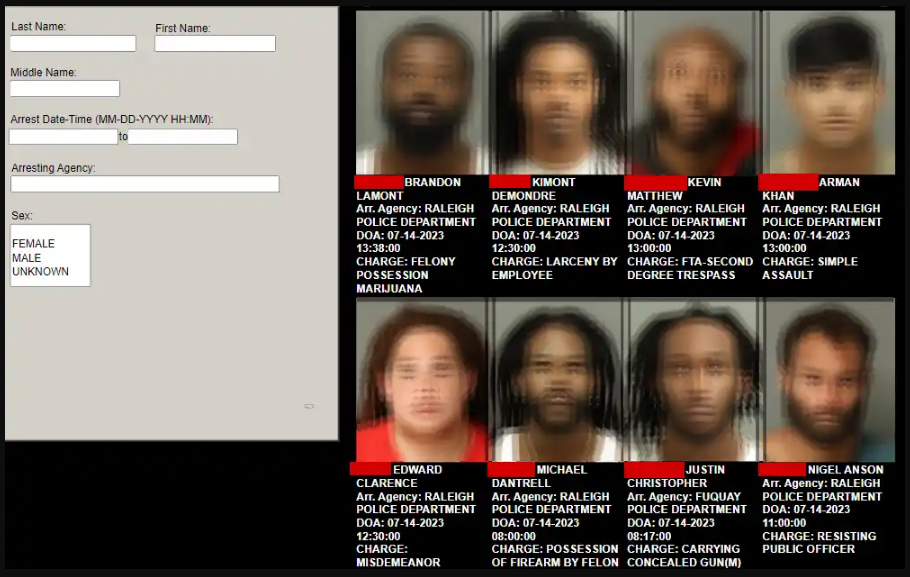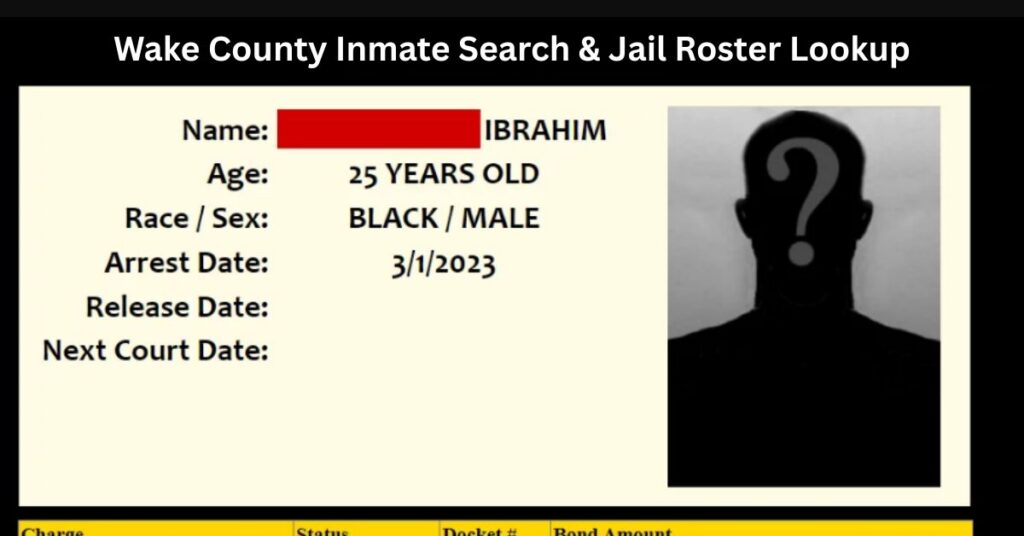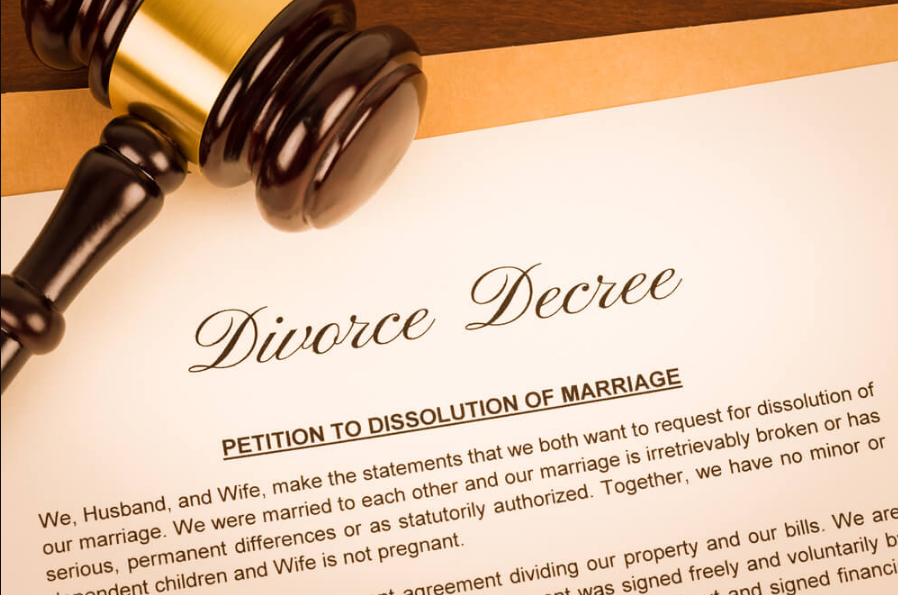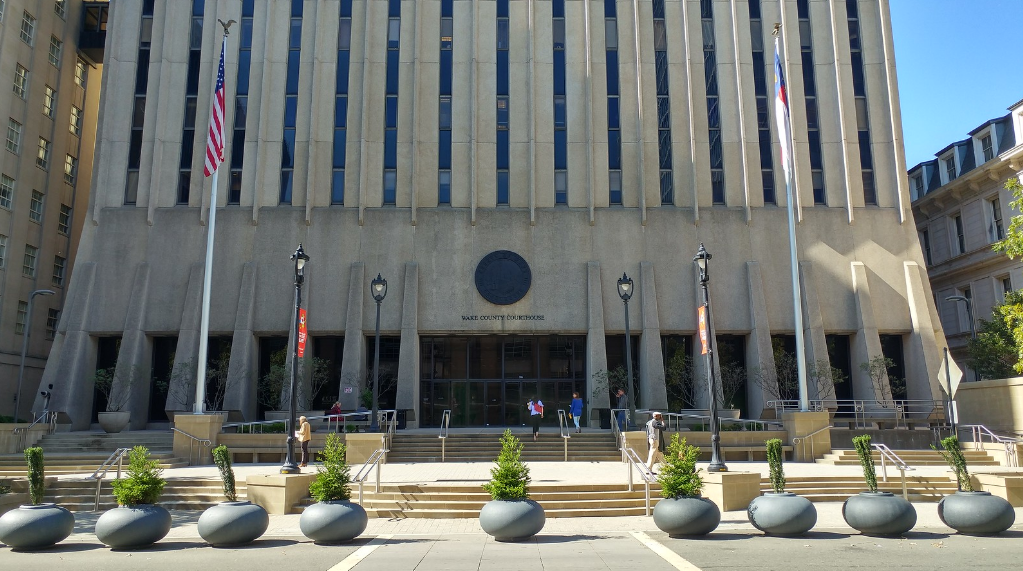If you need access to court information in Wake County, this guide will help you find public records, dockets, and case details quickly and easily. Whether you’re a resident, attorney, or someone involved in a legal matter, knowing how to search for court records can save time and reduce stress. The Wake County Court system handles civil, criminal, family, and traffic cases, offering online tools that allow you to check case statuses, view court dates, and accessrelated documents.
Access to up-to-date court information is important for staying informed about ongoing cases or legal actions. Public records include details like case filings, hearing outcomes, and party information, all available through official county websites. The court also charges reasonable fees for certified copies or certain document requests, which vary depending on the type of document and the processing speed. Current fees start from around $5 for basic records, with additional costs for certification or expedited service.
What Is the Wake County Court System?
The Wake County Court system serves as the foundation for justice in Wake County, North Carolina. It is responsible for handling a variety of legal matters that affect residents, businesses, and the community. Whether you’re involved in a civil dispute, a criminal case, or a family law matter, the court provides a formal process to resolve these issues fairly and efficiently.
At its core, the Wake County Court is divided into two main parts: the District Court and the Superior Court. Each court has a distinct role, jurisdiction, and types of cases it manages. Knowing the difference helps you understand where your case will be heard and what to expect.
Structure: District Court vs. Superior Court
Wake County’s District Court focuses on less serious criminal cases, traffic violations, family law issues such as child custody and support, and small claims cases. It acts as the first level of court and often deals with cases that require faster resolutions. For example, misdemeanors and preliminary hearings for felony charges fall under District Court.
Superior Court handles more serious criminal cases, including felony trials, and civil cases involving higher amounts of money—generally above $25,000. It also deals with appeals from District Court decisions and more complex family law matters like divorces involving significant property division.
Court Locations in Wake County
Wake County operates several court facilities to serve the community efficiently:
- Wake County Justice Center (located in downtown Raleigh) is the main courthouse for Superior Court cases.
- Wake County District Courtrooms are located at multiple addresses, including the Wake County Courthouse and nearby annex buildings.
Each location has specific hours, security procedures, and parking options. Checking the exact venue for your hearing or filing helps avoid delays.
Common Legal Matters Handled
The Wake County Court system addresses a broad range of cases, including:
- Criminal cases (both misdemeanors and felonies)
- Traffic violations and infractions
- Family law matters such as custody, child support, and divorce
- Civil disputes involving contracts, property, or personal injury
- Small claims for claims under $10,000
- Juvenile matters, including delinquency and abuse/neglect cases
By covering these areas, the court ensures residents have access to justice for most legal needs.
Jurisdiction and Services Offered
Wake County courts have authority to hear cases that arise within county boundaries. District Court has limited jurisdiction for lower-level matters, while Superior Court covers broader and more serious cases.
Beyond hearings and trials, the court offers services such as:
- Case filing and record searches
- Mediation and alternative dispute resolution options
- Jury duty coordination and information
- Public access terminals for court records
- Assistance with paperwork and court procedures
These services support both legal professionals and the public in managing cases effectively.
Wake County Court Records Search
Accessing court records in Wake County is straightforward when you know the right steps. Whether you need information for legal matters, personal research, or verification, Wake County court records provide comprehensive details about cases filed in the local courts.

This guide will help you find the records you need quickly and confidently.
How to Access Court Records Online
Finding Wake County court records online is simple and can save you time compared to visiting the courthouse in person. Follow these steps for a smooth search experience:
- Visit the Wake County official court records search portal – This is the primary source for up-to-date court information.
- Use the internal search tool – Enter the required information such as the full name of the person involved, date of birth, or case number if available. This improves the accuracy of your results.
- Browse the results – Look through the cases matching your search criteria. You can view summaries, hearing dates, case status, and more.
- Request detailed documents if needed – Some documents may require a formal request or a small fee. Prices vary depending on the type of record and document copy you need; typically, fees range from $1 to $15.
For convenience, you can also use our [Wake County Court Records Search bar] to start your lookup immediately.
Types of Records You Can Find
Wake County courts handle various case types. Here are some common records you can access:
- Criminal and Civil Court Records
These include felony and misdemeanor cases, lawsuits, judgments, and other court actions. - Traffic and Small Claims Cases
Information on traffic violations, parking tickets, and small claims court filings. - Probate, Evictions, and Restraining Orders
Probate records cover wills and estates, while eviction and restraining order documents provide details about landlord-tenant disputes and protection orders.
Each category of records may have different access levels or restrictions depending on privacy laws and court rules.
Required Information to Perform a Search
To get the best results when searching Wake County court records, having accurate information helps:
- Full Name: Enter the complete name of the individual involved.
- Date of Birth: Helps distinguish between individuals with similar names.
- Case Number: Optional but highly useful if you already have it, as it directly identifies the case.
Tips for Better Search Results:
- Double-check spelling before searching.
- Use quotes around full names if the search tool supports it.
- Narrow your search by adding a date range if possible.
- Start broad if you’re unsure, then refine based on the results.
Wake County Case Lookup Tool
The Wake County Case Lookup Tool provides real-time access to court records. Whether you are a lawyer, a party to a case, or simply researching, this tool simplifies finding case details without visiting the courthouse.
Using the Case Search Feature
The case search feature allows you to filter cases by multiple criteria for better precision. You can search by:
- Name: Enter the full or partial name of the defendant or plaintiff.
- Case Type: Choose from criminal, civil, traffic, or family court cases.
- Court: Select the specific court within Wake County, such as Superior Court or District Court.
Results update instantly as you enter your search terms, saving time and ensuring you see the most current information available.
Sample Case Results
Once you run a search, the case lookup tool displays a list of matching cases along with key details, including:
- Charges or Claims: The specific allegations or legal issues involved.
- Case Status: Current standing, such as active, closed, or pending.
- Important Dates: Filing dates, court hearings, and disposition dates.
This transparency helps users track case progress and prepare for upcoming court dates or decisions.
Wake County Inmate Search & Jail Roster Lookup
Finding accurate inmate details is important for many reasons—checking on loved ones, confirming bookings, or researching legal cases.

Wake County provides a public jail roster to support transparency and public safety.
Search Current & Past Inmates
You can search for inmates currently held in the Wake County Detention Center as well as past inmates recently released or transferred. The online jail roster is updated regularly to ensure the information reflects the most recent status.
Search options explained:
- Name Search: Enter the full or partial name of the inmate.
- Booking Number: Use a specific booking number if you have it.
- Date Range: Filter searches by booking dates to narrow results.
- Release Status: Identify if the inmate is still in custody or released.
This flexibility helps users find inmate records efficiently without confusion or delays.
Mugshot, Charge, Booking Date Info
Each inmate’s profile typically includes:
- Mugshot: A recent photo taken during booking.
- Charges: Details about the offenses the inmate faces.
- Booking Date: The date the inmate was admitted to the facility.
- Bond Information: If applicable, bond amount and conditions.
These details provide a comprehensive snapshot of an inmate’s status and legal situation.
Wake County Detention Center Contact
If you need to reach the Wake County Detention Center, the following contact information is essential. Whether you want to inquire about visitation, phone calls, or jail procedures, this section provides direct access.
Jail Address:
3301 Hammond Road, Raleigh, NC 27603
Phone Number:
(919) 856-6600
Visiting Hours:
Visiting hours vary by inmate housing unit and day of the week. Visitors should call ahead or check the official Wake County website for the current schedule. Generally, visits are allowed on weekdays and weekends with specific time slots.
Wake County Traffic Court Information
Wake County Traffic Court handles all traffic violations issued within the county. Whether you received a speeding ticket or face more serious charges, knowing your options and obligations can save you time and stress.
Traffic Ticket Lookup & Payments
If you received a traffic citation in Wake County, you can quickly find and pay your ticket online. This helps avoid late fees and keeps your driving record in good standing.

To check your citation:
- Visit the official Wake County traffic ticket portal.
- Enter your citation number or personal details as requested.
- Review the citation details including the violation and fine amount.
Payment methods typically include credit/debit card and electronic checks. Paying online is fast and secure, and the court accepts payments 24/7.
Important: The fine amount varies based on the violation but typically ranges from $50 to $200. Early payment may reduce additional penalties.
How to Find and Pay Traffic Citations
You can also pay in person at the Wake County Courthouse located at 316 Fayetteville Street, Raleigh, NC. The courthouse accepts cash, checks, and card payments during business hours (Monday to Friday, 8:30 AM to 5:00 PM).
If you prefer mailing your payment, send it to:
Wake County Traffic Court
P.O. Box 1595
Raleigh, NC 27602
Include your citation number and driver’s license information with the payment.
License Points and Court Appearance Rules
Traffic violations in Wake County may add points to your driver’s license. Accumulating too many points can lead to higher insurance rates or even license suspension.
- Minor infractions usually carry fewer points.
- Serious violations, like DUI or reckless driving, carry more points and stricter penalties.
If your citation requires a court appearance, you will receive a date on your ticket. Missing your court date can result in additional fines or a warrant for your arrest.
You can often request a court date online or by phone if you cannot attend on the specified date.
Dealing with Infractions or Misdemeanors
Traffic offenses in Wake County range from minor infractions to misdemeanors. Minor infractions typically involve fines and points but do not require legal representation. However, misdemeanors might include jail time or more serious penalties.
When to Hire a Lawyer
If your case involves a misdemeanor or could impact your driving privileges significantly, consulting an attorney can protect your rights. Legal help may be needed if you face:
- Driving under the influence (DUI) charges
- Reckless driving
- Multiple violations affecting your license status
- Complex cases requiring negotiation or trial
Online vs. In-Person Court Appearance
Wake County offers options for both online and in-person court appearances for certain traffic cases.
- Online appearances allow you to resolve minor cases remotely via video or phone hearings, saving time and travel.
- In-person court is required for more serious cases or if you want to present evidence or testimony directly.
Check your ticket or the court website for eligibility details and instructions on how to attend your hearing.
Civil Case Types Handled
The Wake County Civil Court hears a wide range of non-criminal cases. These often involve disagreements between individuals or organizations over rights, obligations, or property.

Here are the most common civil case types:
Property Disputes
Property-related cases often involve boundary disagreements, ownership rights, or damage claims. These cases are resolved through formal evidence and legal documents.
Contract Violations
Contract disputes are one of the most frequent case types. Whether it’s a business agreement, lease, or service contract, the court determines if a legal obligation was broken and what compensation is fair.
Small Claims Court Process
For claims under $10,000, Wake County offers a Small Claims Court option. This process is quicker and more cost-effective than traditional civil court. Most small claims involve unpaid rent, deposits, or minor property damage. Filing fees start at $96 as of May 2025. Hearings are often scheduled within 30-60 days; both parties can represent themselves.
Family Law Records
Family matters are often personal and emotionally challenging. The Wake County Family Court provides legal support for sensitive issues involving children and spouses.

Child Support, Custody, and Divorce Filings
- Child Support: Calculated using North Carolina’s Income Shares Model, which considers both parents’ income. Adjustments can be requested if circumstances change.
- Custody Cases: Courts focus on the child’s best interest. Both physical and legal custody are considered. Mediation is often required before court hearings.
- Divorce Filings: North Carolina law requires a one-year separation before filing for divorce. Filing fees typically start at $225, excluding additional costs for serving papers or legal representation.
To access family law records, individuals can request them at the Clerk of Superior Court or through the North Carolina Judicial Branch portal. Some records may be restricted, especially those involving minors or sealed court orders.
What Users Need to Know
- All filings for civil or family cases are handled at the Wake County Courthouse, located in downtown Raleigh.
- Court records are public unless sealed, and can usually be accessed online.
- For legal help, residents can reach out to Legal Aid of North Carolina or seek assistance at courthouse self-help centers.
Wake County Criminal Court Process
Understanding how the Wake County Court handles criminal cases helps residents, defendants, and families know what to expect. Whether facing charges or searching for case updates, knowing the steps and available tools can ease confusion.
The Wake County Criminal Court deals with both misdemeanors and felonies. The handling process, penalties, and timeline differ depending on the severity of the offense. Here’s what you need to know:
Misdemeanors vs Felonies
Misdemeanors are less serious offenses, such as minor theft, trespassing, or disorderly conduct. These cases are usually handled in District Court. Penalties often include fines, probation, community service, or short-term jail time (typically less than 12 months).
Felonies involve more serious charges like burglary, drug trafficking, or assault with a deadly weapon. These are handled in Superior Court and can result in longer sentences, sometimes involving state prison. Felony charges may begin in District Court but are transferred to Superior Court for trial.
Knowing the type of charge is key, as it affects the process and possible outcome. Defendants should attend all court dates and follow any instructions from the court or their attorney to avoid further penalties.
How to Track Criminal Cases
If you’re looking for updates on a Wake County Court criminal case, there are several tools available:
- Wake County Arrest Records: These include the booking date, charges, and status. You can search these through the Wake County Sheriff’s Office or North Carolina’s public offender search portals.
- Court Dates: To check upcoming hearings, use the North Carolina Court Calendar. Search by name or case number to see scheduled dates in District or Superior Court.
- Case Outcomes: Once a case concludes, outcomes are listed in public court records. This includes verdicts, sentencing, and case closure details. These records are available online or at the Wake County Clerk of Court’s office.
These tools help families, attorneys, and individuals stay informed. Tracking a case is also useful if you need to provide documentation to employers or apply for record expungement later.
Marriage, Divorce, Probate & Estate Records
Wake County Court keeps official records for life events that carry legal and personal significance. Whether you’re applying for a marriage license, looking up a divorce decree, or settling a loved one’s estate, these records serve as proof and support for key decisions.

Knowing where to request them, what to bring, and how much it costs helps avoid delays and ensures the process is smooth.
Requesting Certified Copies
Certified copies of marriage licenses, divorce decrees, and probate records are available through the Wake County Register of Deeds or the Clerk of Superior Court. These official documents are often needed for legal name changes, insurance claims, or settling estates.
Marriage and divorce records:
- Available for events that occurred in Wake County.
- Requests can be made in person, by mail, or online.
- The typical fee for a certified copy is $10.
- Processing usually takes 3–5 business days, though faster service may be available with express options.
Who can request?
Anyone may request a certified marriage certificate. Divorce and probate records may have restrictions based on the type of record and who is involved in the case.
Where to Get Marriage Licenses
Marriage licenses in Wake County are issued by the Register of Deeds Office. Both applicants must apply in person and bring valid identification, such as a driver’s license or passport.
Marriage License Details (as of May 2025):
- Fee: $60
- Valid for 60 days
- No waiting period
- No blood test required
- Must be used within North Carolina
You can schedule an appointment online or walk in. Expect the process to take about 20–30 minutes. After the ceremony, the license must be returned to the Register of Deeds for recording.
Divorce Decree Lookup Process
To find a copy of your divorce decree, you will need to contact the Wake County Clerk of Superior Court. The clerk maintains all civil court case files, including divorce judgments.
What you need:
- Full names of both parties
- Date or year of divorce
- Case number (if known)
You can search divorce records in person at the courthouse or request copies by mail. Some records may be available through the online eCourts system, depending on the case status and year filed.
Fees:
- Certified copy estimate: $10
- Search assistance by staff estimate (if needed): $25 per hour
Probate & Estate Cases
When someone passes away, Wake County Court handles the legal steps involved in managing their estate. This includes validating wills, appointing executors or administrators, and overseeing asset distribution.
Wills, Estate Settlements, and Guardianship
Wills and probate:
- Must be filed with the Clerk of Superior Court
- The court checks the will’s validity and gives the executor authority to manage the estate
- Probate fees vary but often start at $120, plus additional costs based on estate value
Guardianship cases:
If a person becomes unable to manage their affairs, the court may appoint a legal guardian. These cases are handled through special proceedings and often involve medical evidence and formal petitions.
How to file:
- Visit the Estates Division at the Wake County Courthouse
- Bring original documents and a valid ID
- You may need legal advice for complex situations
Wake County Courthouse Details
The Wake County Courthouse is the central location for handling legal matters across Wake County, including civil disputes, criminal cases, family law, and traffic violations. Located in downtown Raleigh, the courthouse serves thousands of residents each year. Its central role in the community makes it a key resource for those needing legal support, filing documents, or attending scheduled hearings.

The building is accessible to the public and designed to support various court services under one roof, making it easier to find what you need in one visit.
Physical Address
Wake County Courthouse
316 Fayetteville Street
Raleigh, NC 27601
This is the main courthouse location for all Wake County Court cases, including superior, district, and small claims matters.
Phone, Email, and Parking
Main Phone Number: (919) 792-4000
Clerk of Court: (919) 792-4000 (follow prompts based on your case type)
Email: While Wake County does not list a central email for the courthouse, online contact is available via the NC Courts portal.
Parking Information:
Public parking is available at nearby garages and lots. The closest garage is the Municipal Parking Deck on Wilmington Street. Rates typically range from $1.50 to $2.00 per hour, with a daily max of $12. Metered street parking is also available, but may have time limits.
Visitors should plan to arrive early, especially during high-traffic times like Monday mornings or after holidays.
Working Hours
Regular Business Hours:
Monday – Friday: 8:30 AM to 5:00 PM
Closed on weekends and North Carolina state holidays.
Note: Court sessions often start at 9:00 AM, so arriving early is recommended for security screening and check-in. Filing windows may close earlier than 5:00 PM, depending on the department.
Key Info for Visitors
- Security screening is required at all entrances.
- Face masks are optional unless otherwise posted.
- Courtroom assignments can be found on monitors inside the building.
- If you’re unsure where to go, the information desk near the main entrance can help.
Frequently Asked Questions (FAQs)
Need help with Wake County Court? Here are quick answers to common questions about case numbers, records, and hearings — updated for 2025.
How do I find a case number in Wake County?
To locate a case number in Wake County, start by visiting the North Carolina Judicial Branch’s public access portal. From there, select “Court Calendars” or “Court Dates” and enter the party’s name or attorney. You can also search through the Wake County Clerk of Superior Court office for in-person support.
If you’re looking up civil or criminal cases, try the Court Date Inquiry System. You’ll need the full name or date of birth of the person involved. Case numbers usually appear on official documents, summons, or court notifications.
Are Wake County court records public?
Yes, most court records in Wake County are open to the public. This includes civil, criminal, traffic, and probate cases. However, certain records are restricted — for example, cases involving juveniles, adoption, or sealed court orders.
You can access public records through the courthouse terminals or by visiting the NC Judicial Branch website. Some documents may require a small fee for copies, typically ranging from $0.25 to $2.00 per page.
How can I remove my name from public records?
Removing your name from Wake County court records is limited and depends on the case type. You may be eligible to file for expunction (expungement) if your case meets certain requirements — such as a dismissed charge, not guilty verdict, or completed deferred prosecution.
To start, contact a Wake County attorney or visit the Wake County Clerk’s Office to get information about your eligibility. Filing fees usually range from $175 to $200, unless waived due to income level. Keep in mind, approval is not guaranteed, and processing times vary.
What does “disposed” mean in court status?
“Disposed” means the case has reached a final decision. This could mean a verdict was issued, the case was dismissed, settled, or otherwise concluded. It doesn’t always mean a conviction or admission of guilt.
For civil cases, it might mean the matter was resolved by agreement or judgment. In criminal cases, it could reflect a plea deal, sentencing, or dismissal. You can verify the details through the Wake County court records portal or contact the Clerk’s Office.
How do I attend a hearing virtually?
Wake County courts offer virtual hearings for select case types. If your hearing qualifies, the court will notify you with login details via email or mail. Most virtual hearings use Webex or similar platforms.
To attend:
- Check your hearing notice for login instructions.
- Ensure you have a device with a camera, microphone, and internet connection.
- Join at least 10–15 minutes early to test audio/video.
- Dress appropriately and follow courtroom behavior standards, even online.
If you don’t receive a link or have trouble connecting, call the Wake County Clerk of Court office directly.
Real Value to Wake County Residents
This information helps save time, reduces confusion, and makes court processes easier to handle. Whether you’re checking on a legal matter, seeking record updates, or attending a virtual session, Wake County offers accessible tools to support residents and legal professionals.
Updated: May 2025 — Fees and services mentioned reflect the most recent updates from official Wake County court resources.